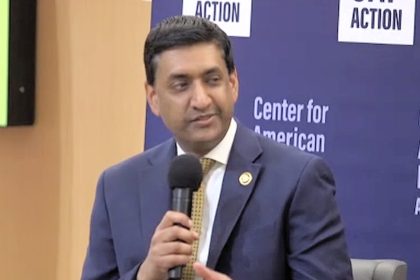BPC Considers a Points-Based Immigration System for the US

WASHINGTON — The issue of immigration can be polarizing, but the Bipartisan Policy Center has decided to tackle the topic with a series of discussions on immigration policies around the world. The think tank’s latest dialogue coincides with the launch of its new report examining how the immigration systems in Canada and Australia have evolved over time and could inform a points-based immigration system in the United States.
Both of these nations use points-based systems for immigration that allocate points based on merit, qualifications, and other personal characteristics. Though they have different ways of approaching the methodology and designing their selection grids, both have also successfully revised their methods over time. So while debate continues surrounding points-based immigration systems, it is interesting to consider whether this methodology may or may not be replicable in the United States.
“The American public supports immigration, but thinks our system doesn’t work,” said Ruth Wasem, a BPC fellow who also used to conduct extensive immigration policy research for the Congressional Research Service. “[Still] what we are proposing [in this report] would be a dramatic departure for the U.S.”
The BPC report suggests that for a nation to implement a points-based immigration system, it needs three key components. The first is government secured public support for skilled migration; second, the capacity to make policy changes quickly and flexibly; and third, the ability to gather comprehensive data.
Creating a points-based system is all about developing the narrative and creating messaging to get the public on board, according to Daniel Hiebert, a BPC panelist and professor of Geography at the University of British Columbia. He explained that, in the late 1980s, the Canadian government realized the labor force was shrinking, and aligned support for well-managed immigration with economic benefit.
“[This] spoke to the past of Canadian immigration as a frequently used solution for national problems,” said Hiebert, “and built on components of earlier narratives that resonated with Canadians,” like meeting a new demographic challenge, selecting immigrants that were going to make a positive impact on Canada, and ensuring Canada remained an open and diverse society. “It helped build an elite consensus… which helped a lot, too.”
“[Australia] dealt with immigration from the perspective of population and urban structure,” which contributed to public support overall for immigration according to Nana Oishi, associate professor at the University of Melbourne. “It was as an economic factor that [immigration] played the most important role in Australia’s policy.”
With the country’s strong economic growth in the 1990s and early 2000s, Oishi believes it was relatively easy for citizens to support then-Australian Prime Minister John Howard’s policies, which prioritized skilled immigrants, but cut back on family-based or asylum-based migration. Australia’s long history as a nation of immigrants counted heavily as well.
“Support is decreasing lately, however,” said Oishi, pointing to Australia’s overpopulation, overcrowding, and recent surge in property prices. The country has seen a shift from its emphasis on permanent immigration to temporary visas, and is looking more favorably on migrants who seek to settle in rural areas.
Messaging on immigration in the United States may be more complicated.
“It was extremely difficult to do immigration legislation even at times when there was strong bipartisan support,” reminded Wassem, suggesting that “a mission statement from the top down will not be effective.”
Instead, she recommends holding Town Halls, field hearings from Congress, and potentially convening special commissions to raise the issue beyond Washington. “It’s important to meet the public where they are,” she said.
This also speaks to Canada and Australia’s capacity to use executive authority to implement and revise their immigration systems. Both countries use Parliamentary systems where legislation is known to move more quickly.
“The U.S. doesn’t have a Parliamentary form of government,” said Wasem. “Congress has power over immigration. This makes things different, but not impossible.”
The Australian Migration Act of 1958 showed the significant power that the Australian executive wields, while Canada, for its part, has Orders in Council. This is a legal instrument that gives ministers a great amount of flexibility in achieving policy goals.
“There’s not a press conference or big fanfare [when a policy decision is being made], so you can have a fundamental reordering of things,” explained Hiebert. While this enables pliability in the system, it also means the public is removed from the process. “Not hearing debate and not being engaged or knowledgeable… can have a jarring impact,” admitted Hiebert, “and can lead to political blowback.”
Wasem appeared to favor special commissions as a mechanism to implement immigration change in America. “Commissions in immigration are a long standing tradition in the U.S.” she said, “[though] they recommend changes in the law, not implement them.”
The third key component to a points-based immigration system is comprehensive data and intelligence.
Canada’s Longitudinal Immigration Database is a robust tool for the nation that tracks a host of factors to see how immigrants are faring over time. “Demographics taken on arrival are married with all of their information after entry,” said Hiebert.
This information includes census and social survey information as well as iCare settlement program database information, “so [Canada] will know the complete economic impact of each immigrant… and can calibrate [its] selection mechanism with economic outcomes.”
Australia collects information similarly, with a continuous survey of immigrants to see if the influx is meeting economic and policy goals. If not, the country is prepared with statistical information to make changes so targets can be achieved.
“The U.S. maintains this data, but it’s fragmented,” explained Wasem. “The hurdles are really… the privacy protections.”
“What is the balance between the personal right to privacy and the ability to shape policy in really profound ways?” Hiebert asked. “Canada focused more on the public’s right to know.”
To consider creating a similar points-based system in the United States would require that any system be not only dynamic and responsive, but also accommodate U.S. institutions, political culture, and its unique immigration heritage.
Dealing with the current backlog of immigrants seeking to come to the United States is also a factor, as well as any excess a points-based system would generate.
“[The U.S. would] need to design a system to deal with the mega numbers of people eager to come to your country,” said Hiebert. “If the U.S. moves in this direction, the level of interest globally is going to be gigantic.”























